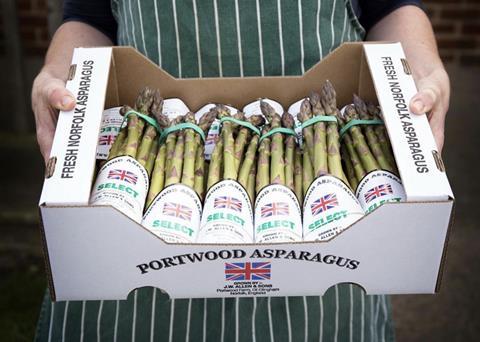Paul Grimshaw of NCGM catering supplier D.D.P and Andy Allen of Portwood Asparagus give us the lowdown on the 2025 British asparagus season and the sustainability challenges facing producers

Every year at the start of the asparagus season, New Covent Garden Market catering supplier D.D.P Ltd takes 15-20 chefs from one of its contract caterer customers, Elior & Lexington, to meet its grower and supplier of English asparagus, Portwood Farm, in Norfolk.
UK-grown produce is crucial to Elior & Lexington’s menus, as it works through the domestic seasons with D.D.P to source and promote the best of British throughout the year.
Paul Grimshaw, managing director of D.D.P, says: “The annual visits to growers are a great source of education for the chefs and also a show of respect for what many of our British farmers have to endure and the myriad challenges they are up against almost daily.
“The day is about passionate food people meeting passionate growers and it’s always a fantastic meeting of minds. The chefs not only get their hands dirty and pick the asparagus, they can oversee it going into the warehouse to be washed, graded and packed.”
Portwood uses state-of-the-art equipment to wash and hydro-cool the crop along with computer-operated photographic image technology to accurately grade each and every spear – by thickness, length, colour, curvature and maturity.
Its fridges are fitted with hi-tech fogging equipment to ensure the asparagus does not dry out and that consistency and shelf life is maintained for as long as possible. The aim is always to deliver asparagus to customers within 24 to 48 hours from harvest.
“There was also time for a quick ‘ready steady cook’ competition to produce some wonderful dishes in a very short space of time, within a couple of hours of the asparagus being picked,” Grimshaw adds.
Portwood’s owner Andy Allen, who judged the competition, gives us his thoughts on asparagus, Norfolk production, and the hurdles that UK growers have to overcome to produce the vegetable sustainably.
What makes Norfolk ideal for growing asparagus?
Norfolk’s deep soils and generally drier climate are very well suited to asparagus production. We do suffer from cold north-easterly winds, which tend to slow down growth. However, inadvertently, they also have a positive impact on the flavour profile.
How else is asparagus affected by the British weather?
English Asparagus can be affected dramatically by the vagaries of our maritime climate, which changes all the time and not always when you’d like it to! Discernibly changing weather patterns over the 35 years I have been growing this crop – predominantly milder winters and wetter springs – have hampered the growth cycles of our asparagus, along with greater extremes we see unpredictably throughout the year.
In Peru, Mexico and much of southern Europe, for example, the climate and day and night time temperatures are generally warmer and fluctuate far less, which gives them a much more even growing pattern.
Aside from the weather, what are the biggest challenges you face as a grower?
Apart from the weather, the biggest challenge we face is the availability of labour to harvest and pack our crops. Since Brexit stopped the free flow of labour between us and mainland Europe, we have seen big shortages of people. Many growers, including us, have been forced to leave crops unharvested in the fields as they have simply not had the staff to work on their farms. Here at Portwood alone, I have lost more than £300,000 worth of asparagus because of this, and it is simply due to Brexit.
The government-operated Seasonal Agricultural Workers Scheme (SAWS) allows overseas staff to come to the UK on six-month visas to fill the massive shortfall of staff willing to carry out seasonal work on farms. Unfortunately, this is only rolled out on an annual basis and we are never certain it will happen again the following year. So, there is a reluctance for growers to plant perennial crops such as asparagus, soft and top fruits as there is an inherent risk that it could be left unharvested due to lack of labour.
We may soon see a change of government and a possible change of attitude to this scheme, but we are already lobbying to ask for a longer-term visa scheme of at least five years (and ideally longer for asparagus).
Without that level of certainty, more English growers will pack up growing fruit and vegetables, which in turn threatens our UK food security and forces higher levels of imports. That would introduce more produce grown to lower standards than we enjoy from homegrown and certified food.
There has never been a more important time for consumers to support and buy UK grown produce. Otherwise, this industry will inevitably decline, shortages of food will be more common, and even higher food prices very much the norm.
How is this season looking?
Here in Norfolk, we began harvesting polythene-protected asparagus on 10 March, almost two weeks earlier than usual, due to the unusually warm weather. We also began to see open crop (non-protected) spears appearing early, so we were getting excited that production would start in earnest sooner as well.
However, the prompt start was followed by two weeks of below-average temperatures and consistent heavy rain, which thwarted our hopes. In reality, with open-field production, it is only now (1 May to be precise) that we are beginning to get going. So now we are saying this is a late start to the season!
We hope that now with more settled and warmer weather forecast, the quality and quantity will increase and supply patterns will become more even and predictable.
What else does Portwood grow?
We also produce purple sprouting broccoli for the wholesale markets in March and April – sold under the Portwood Produce brand and packed in specially designed 4kg boxes.



